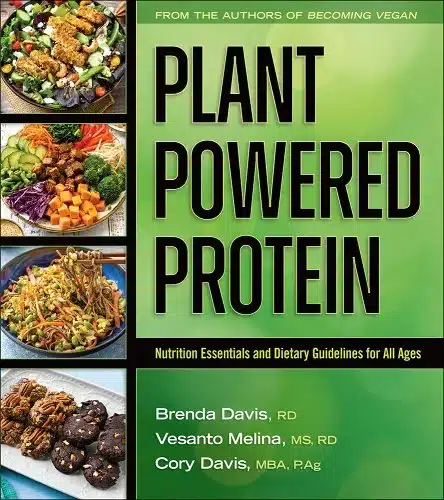
There was a time, many years ago, when I believed that I couldn’t give up eating meat because I needed my protein. I was an athlete after all. I needed lots of protein — even though I had little idea what protein actually was. I only believed that it must have come from animals.
I was wrong.
Chimpanzees and horses and elephants have hardly lacked for muscle mass due to eating only plants. It turns out that plants are an extremely good source of protein and one that the human animal needs to embrace if not only to save animals but this planet.
Which is why I was thrilled to come across Plant Powered Protein by Brenda Davis, Vesanto Melina and Cory Davis — an accessible, in-depth and practical look at the essential nutrients our bodies require and how best to get them.
The meat and dairy industries exert significant control over the false-narratives around protein in this country. And they also benefit from enormous government subsidies; the authors note that without government subsidies a pound of beef would cost $30.
Then there is the environmental cost. Plants provide the same (or more) amount of protein as animals with significantly less carbon footprint. Animals require plants that must be grown and shipped — from far away as Brazil. Why not just cut out the middle animal?
This book begins with an in-depth debunking of common protein myths, such as the myth that animal protein contains essential amino acids that are missing from plant foods. Each chapter includes a quiz that introduces common conceptions and misconceptions.
Extremely valuable are pages upon pages of detailed nutritional breakdowns of grains, vegetables, fruits and even animal products — so you can see for yourself that tofu holds it own quite nicely against beef (with none of the cholesterol). Another myth — tofu won’t cause feminization of males; sorry guys, you can’t use that excuse.
The book will tell you what plants are the best sources of protein and other nutrients. There are also chapters devoted to life’s many stages — protein and pregnancy, infants, children and teens, and elders. If you’re a hard-core athlete, you’ll find that, yes, you can build up your muscles plenty well eating just plants.
Finally, the book includes a variety of foundational recipes ranging from veggie scrambles to the “big bowl.” I plan to tackle the tofu fingers.
If you have questions about protein, if you’re curious about embarking on a plant-based life (or just testing the waters), this book will get you off to an informational and inspirational start.
Plant-Powered Protein: Nutrition Essentials and Dietary Guidelines for All Ages
John is co-author, with Midge Raymond, of the Tasmanian mystery Devils Island. He is also author of the novels The Tourist Trail and Where Oceans Hide Their Dead. Co-founder of Ashland Creek Press and editor of Writing for Animals (also now a writing program).

